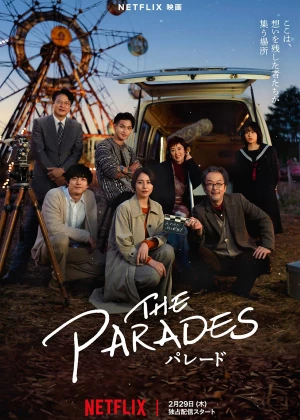The Parades

Director Michihito Fujii seems to feel quite at home at Netflix. Village was an interesting film that showcased the skills of a director with commercial sensibilities, while still retaining a signature style. The Parades [Paredo] sees him repeating the same trick, though this time within a slightly more fantastical setting. Fujii seems more than ready for his theatrical debut, ironically enough that will probably mean the availability of his next couple of films might be in jeopardy. Such is the way of international distribution these days, so all the more reason to enjoy this film.
![screencap of The Parades [Paredo]](/thumbs/img/articles/1200xauto/parades-1.webp)
Fujii possesses a relatively rare skill, especially when limiting our focus to Japanese cinema. He can make a feature with clear commercial appeal while injecting a strong and identifiable personal signature. Not that Japan doesn't have its share of capable blockbuster directors, but few of them can go beyond the material they are adapting. I've seen four Fujii films so far, and apart from his lackluster anime, there's something immediately familiar about his work. In that sense, he might become the next Isao Yukisada, which wouldn't be such a bad thing if I think about it. Right now, Japanese cinema could use a few certainties.
While it's unfair to compare the two films directly, people who have seen Koreeda's After Life will immediately notice the parallels. The film tackles a handful of characters stuck in an in-between world, where they are given time to deal with some unfinished business. Koreeda's style was pensive, slow-paced, and documentary-like, whereas Fujii picked a more commercially viable approach. When forced to choose, I'd choose Koreeda's version any day, but both have their specific appeal and are executed perfectly.
Minako is at the beach with her son, where she enjoys a lovely day out. Disaster strikes and when she wakes up she is all alone. A tsunami has hit the shores and has separated her from her son. She frantically looks for him, but it doesn't take long before she notices nobody can see or hear her. Realization dawns that she has died, luckily she isn't the only one there with unfinished business. She finds a group of like-minded spirits staying at an abandoned carnival. They are a friendly bunch and Minako is welcome to join their club, even though it'll take some time before she can accept her fate.
![screencap of The Parades [Paredo]](/thumbs/img/articles/1200xauto/parades-2.webp)
Fujii makes excellent use of the cinematography to highlight the fantastical elements here. The lighting is warm and soft and gives the film an almost otherworldly glow, there are quite a few landmark shots that help etch the images inside your brain and whenever the film does become a bit darker, the cinematography mimics that vibe without taking away from the overall mood. Maybe the editing could've been a little tighter, but other than that the visuals are pretty much perfect. They give the film its unique signature, making it more memorable in the long run.
Sadly, the soundtrack isn't on the same level. Because the plot is already quite sentimental, the soundtrack would've been an ideal instrument for some counterbalance. Instead, the score seems to lean into the sentimentality and adds to it. Some people might appreciate this, but I found it a bit much. The music isn't all that special and doesn't draw too much attention to itself, it's just that in combination with all the rest, too often it balances on the edge of iffy. It's disappointing as I remember the score of Village being an actual highlight.
The cast is more than solid, with Masami Nagasawa doing very well as the lead actress. Her performance is strong and captivating, the only minor issue is that she gets upstaged by two of the veterans present. Lily Franky and Shinobu Terajima appear in elaborate supportive roles and even without having to make a real effort (they both have had more memorable performances) they outshine the rest of the cast. There aren't any weak links and they all seemed capable enough of fulfilling the brief, it's just that no one went above and beyond.
![screencap of The Parades [Paredo]](/thumbs/img/articles/1200xauto/parades-3.webp)
The film is quite long, but as we're dealing with a group of characters looking to complete unfinished business the longer runtime is justified. What helps is that the different stories are woven into each other quite expertly so it never feels like you're watching several short stories tacked together. There are few surprises or smart twists to keep the audience on their toes though, despite the narrative wealth it all feels very familiar. The film thrives on pretty pictures and comfortable sentiment and while successful, people craving something novel probably won't find it here.
The Parades is a rather accessible film, despite its length and being Japanese. Fans of Japanese cinema may feel it's a little too familiar, but the quality of the execution is excellent and I doubt the film will have many spirited detractors. The fantasy-fueled drama offers a warm and endearing premise, but the lovely cinematography combined with some strong performances lift the film. On top of that, it's readily available on Netflix, immediately alleviating Japanese cinema's biggest hurdle: availability. This one comes warmly recommended.